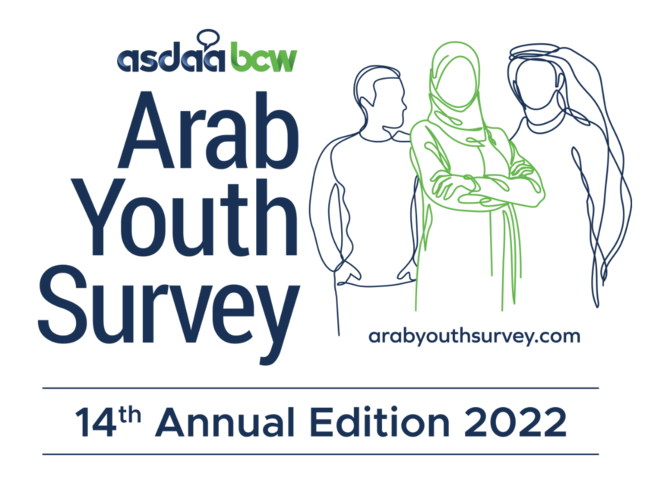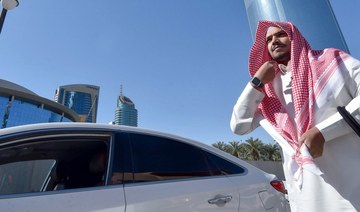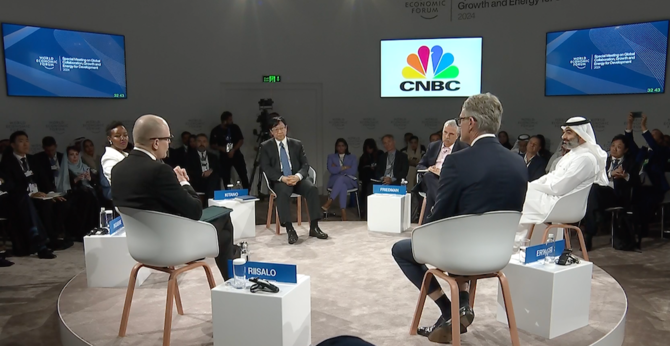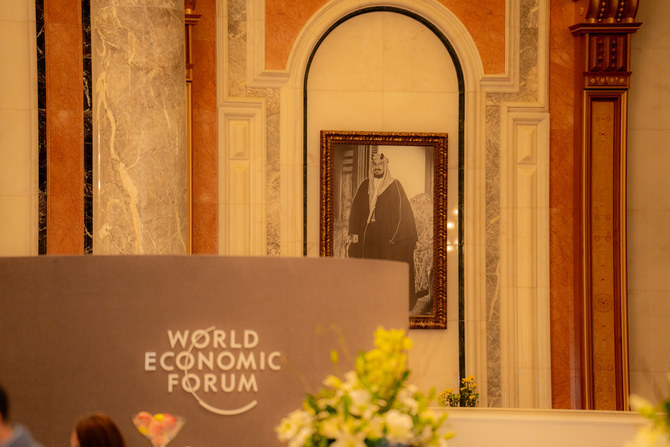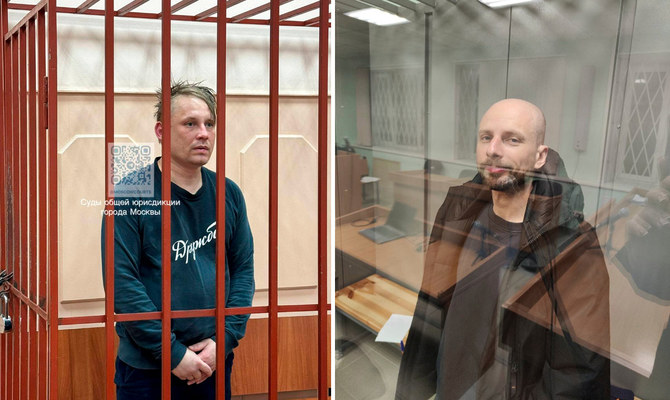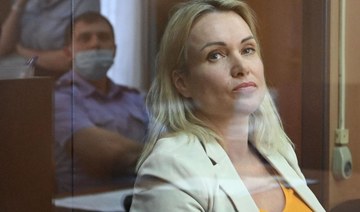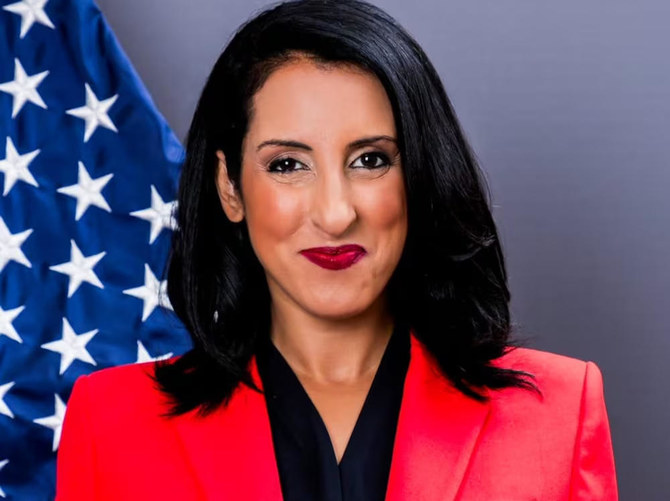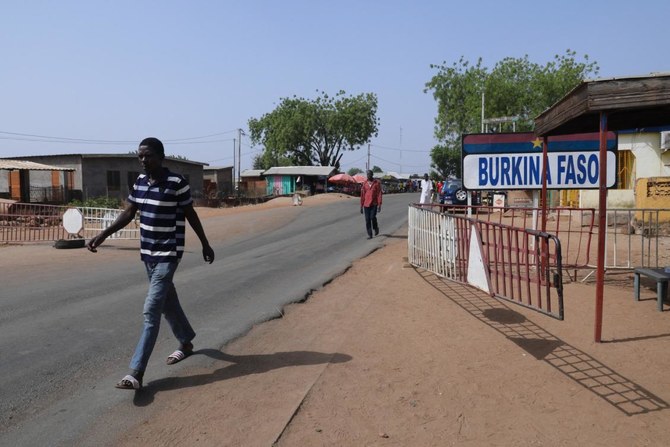DUBAI: Dubai-based PR agency ASDA’A BCW has published the results of its 14th annual Arab Youth Survey, described as the largest independent survey of its kind.
This year’s findings are grouped under six themes: identity, livelihood, politics, global citizenship, lifestyle and aspirations.
Having grown up in the internet age, it is perhaps no surprise that Arab youths are avid users of social media and other online services. In terms of the most popular social media platforms across the region, WhatsApp came out on top, with 82 percent of those surveyed saying they use it daily, followed by Facebook (72 percent), Instagram (61 percent), YouTube (53 percent), TikTok (50 percent), Snapchat (46 percent), Twitter (33 percent) and LinkedIn (12 percent).

WhatsApp is even more popular in Saudi Arabia that it is in the wider region, with 98 percent of people surveyed in the country using it daily. Snapchat was the second-most popular platform in the Kingdom, with 84 percent of people using it daily, followed by YouTube (83 percent), Twitter (73 percent), TikTok (60 percent) and Facebook (55 percent).
Commenting on the potentially controversial inclusion on the survey of WhatsApp, traditionally thought of as an instant messaging service, as a social media platform, Sunil John, founder of ASDA’A BCW and BCW’s president for the Middle East and North Africa, told Arab News: “WhatsApp has evolved as a strong social-networking platform — for families and businesses — and is often the first source of news for many. It plays an important role in the lives of people as a social-networking tool, too.”
Although TikTok ranked relatively low in terms of daily use across the Middle East, usage has more than doubled in the past two years, from 21 percent in 2020 to 50 percent this year. In Saudi Arabia, TikTok use almost tripled over the same period, from 24 percent in 2020 to 60 percent.
Meanwhile Facebook and Twitter have experienced the greatest declines in regional use during that time: Facebook went from 85 percent to 72 percent, and Twitter from 42 percent to 33 percent.
In the Kingdom, Snapchat, Instagram and Twitter grew in popularity over the past two years, but daily use of Facebook declined, from 82 percent to 55 percent.
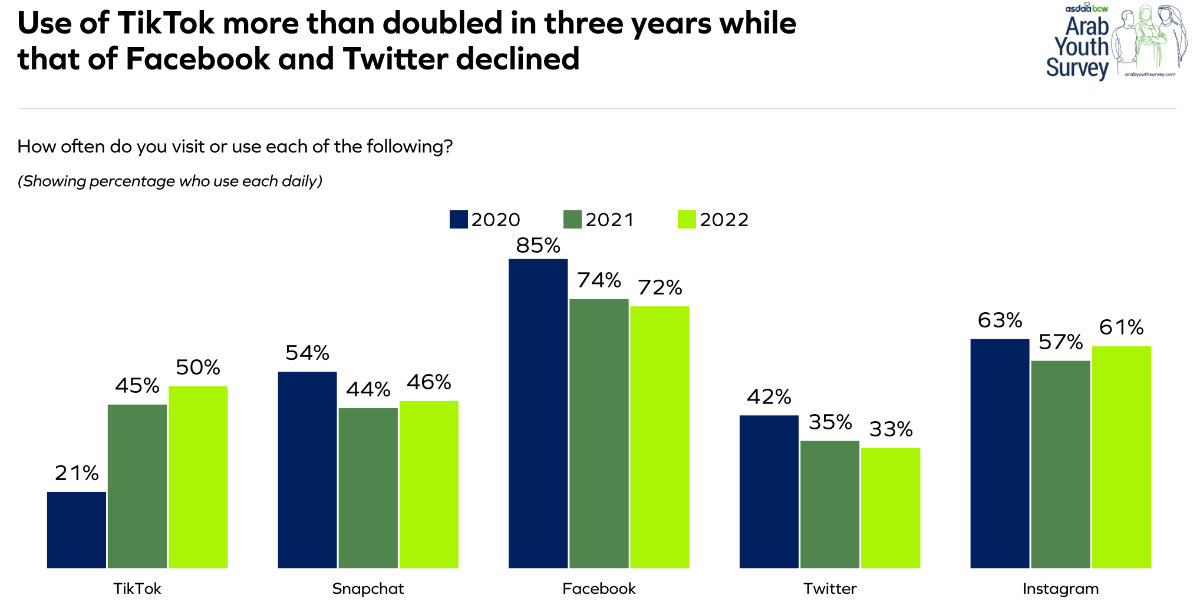
“One of the key trends we’ve noticed is the decline in news consumption, which peaked during the pandemic when people were largely confined to their homes,” said John.
The trend was evident across all channels, although social media continues to be the leading source of news, for 65 percent of those surveyed. This is a small increase from last year’s 61 percent but much lower than the figures for 2019 and 2020, when 79 and 80 percent respectively.
The next most popular source of news was television, on 45 percent, followed by online news portals (32 percent) and printed media (9 percent).
Social media was also the most popular news source in Saudi Arabia, with 43 percent of people relying on it, followed by TV (27 percent) and news websites (23 percent).
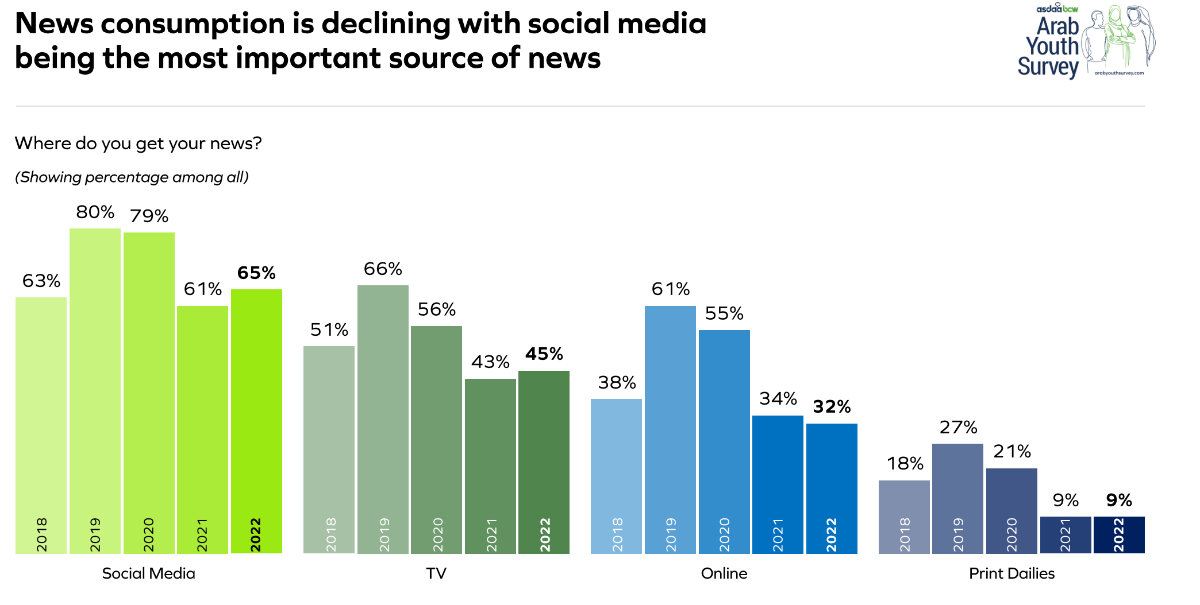
Young people do indeed seem to be consuming less news compared with two years ago, when they were confined to their homes during pandemic lockdowns, said John, and the decline is not exclusive to social media.
“The decline appears to be part of an overall downward trend in news consumption, irrespective of the channel or platform,” he added.
“2020 was arguably an outlier in terms of news-consumption habits. A drop-off as people returned to normal life was to be expected.
“It’s also true that young people are consuming media for different things these days, such as entertainment and shopping. We’re also seeing the emergence of new types of content, such as podcasts, which are often hybrid in nature and harder to classify.”
It is also possible that “young people are ‘tuning out’ from the sheer volume of news they are receiving these days, much of it negative,” John added.
Despite the popularity of social media as a news source, social media influencers and the platforms themselves are among the least trusted sources of news, at just 54 percent and 66 percent respectively. TV news has the highest trust rating, with 84 percent of people confident about it, followed by print and online news portals, both on 71 percent.
In Saudi Arabia, however, social media, TV and online news portals all attracted similar levels of trust.
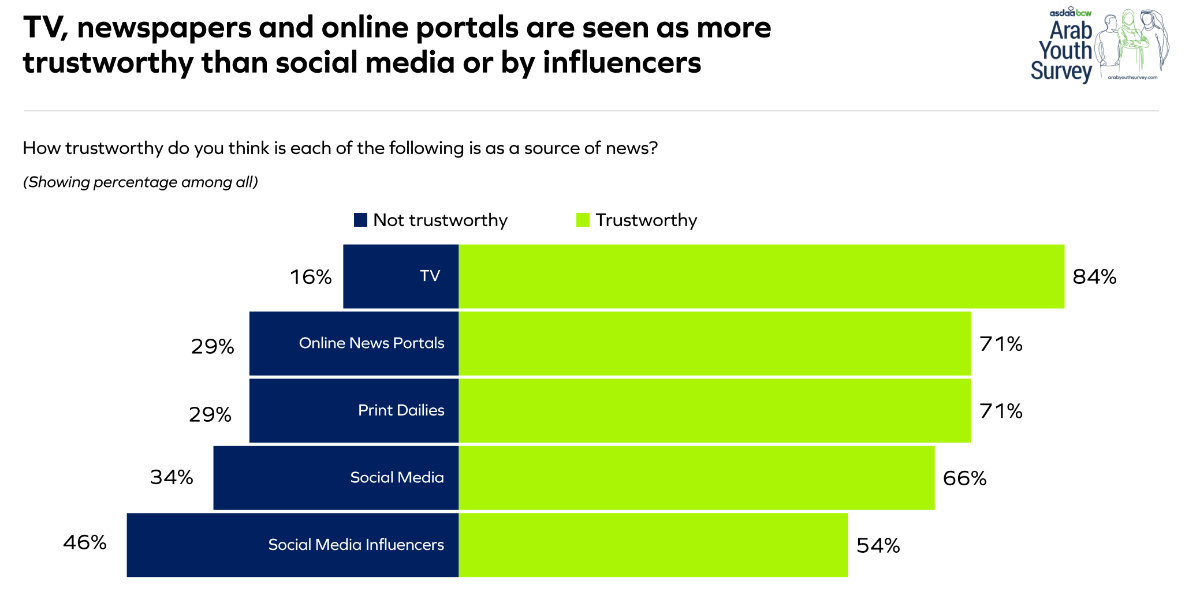
There could be various reasons for the high levels of trust in TV news across the Arab world, according to John, “such as the depth and variety of commentary that TV offers, and the larger budgets for news production that TV stations normally command.”
Moreover, “the growth of TV is also, of course, technological, with the increasing penetration of the internet around the region allowing more people to access streaming services on their mobile phones.”
Although online news portals and print media are among the least-used sources of news, the survey found high levels of trust in both.
“Traditional newspapers are read much less than before in their printed form but they are nevertheless respected for their journalistic pedigree and as news brands,” John said.
“This may explain why online news sites, at least the online versions of what were printed newspapers, enjoy high levels of trust.”
The emergence of “successful news brands specifically designed for the web and social media, and catering to a younger audience, such as NowThis, Vice and Gawker,” could be another reason for the trust placed in online news sites he added.
On the other hand “social media platforms aren’t news platforms by nature,” John said.
“First and foremost, they have been designed to share content and to network. So, they are good at delivering the news but not necessarily coming up with news that people trust. The rise of trusted social media influencers, however, may change this.”
The decline in news consumption might also be a result of young Arabs using the internet primarily for other reasons.
“Arab youth are increasingly consuming media for different things: Entertainment, for example, and shopping,” said John.
In this year’s survey, 89 percent of respondents said they shop online a few times each month compared with only 50 percent in 2018.
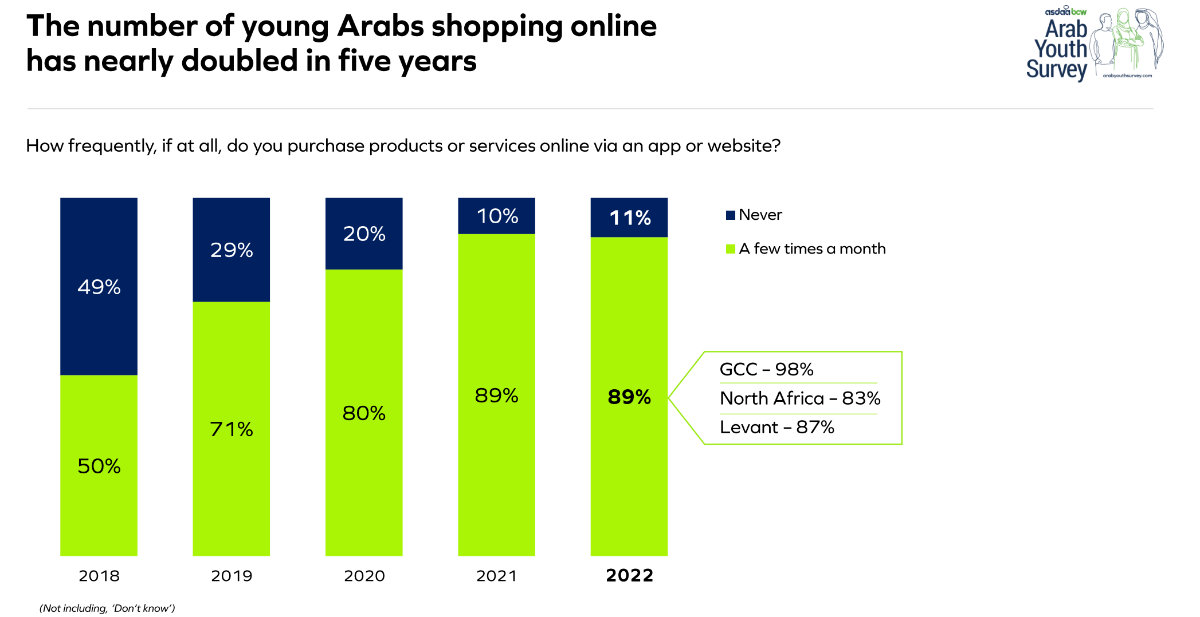
Similarly, the number of young adults in Saudi Arabia who shop online has nearly doubled in the past five years. In 2018, 58 percent of people said they bought products and services via websites and social media apps at least once a month; this year virtually all the respondents said they shop digitally.
“This year’s research found a marked increase in the number of young adults saying they use websites and social media apps to shop for goods and services at least a few times a month,” said John. “And this trend is not only confined to the wealthier Gulf Cooperation Council countries.”
The 14th Annual ASDA’A BCW Arab Youth Survey is based on face-to-face interviews and surveys conducted with men and women between the ages of 18 and 24 in 50 cities across 17 Arab states. Visit arabyouthsurvey.com for the full results.



